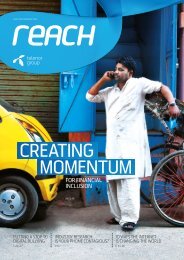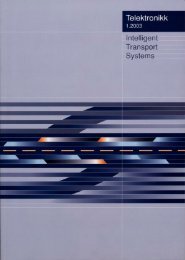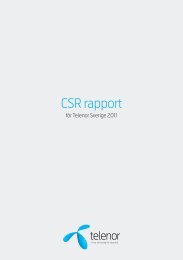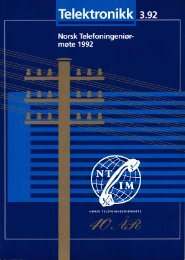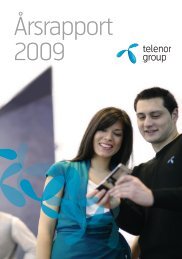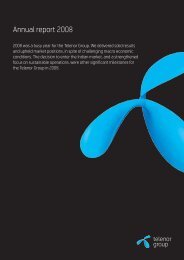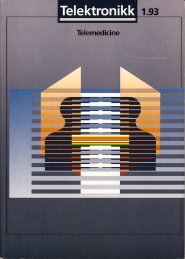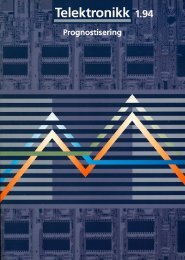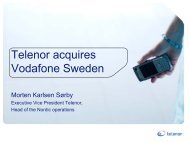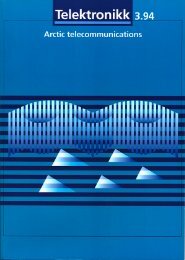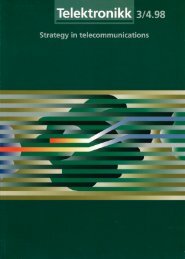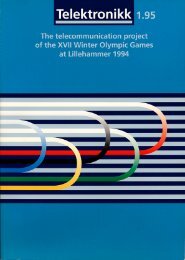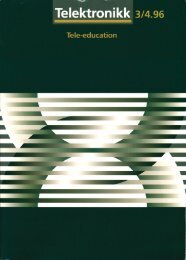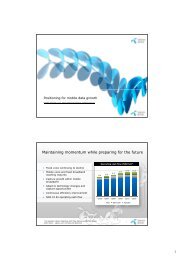Create successful ePaper yourself
Turn your PDF publications into a flip-book with our unique Google optimized e-Paper software.
was concluded that TSAG could be used as a<br />
tool in between WTSAs to solve part of these<br />
problems.<br />
WTSA passed a resolution delegating authority<br />
to TSAG to act on behalf of WTSA in between<br />
two WTSAs. The authorisation now includes the<br />
ability to restructure and establish ITU-T Study<br />
Groups and to assign chairmen and vice-chairmen<br />
to act until the next WTSA, to issue advice<br />
on Study Group schedules and to advise the<br />
Director on financial matters. TSAG is also<br />
requested to consider establishing two new permanent<br />
groups: a strategy group to develop a<br />
policy and strategy for the Sector and an operational<br />
group to develop working methods.<br />
<strong>Telenor</strong> supports the delegation of more power<br />
to TSAG, which meets once or twice a year. We<br />
find that enhancing the role of TSAG is a good<br />
way of progressing necessary decisions, which<br />
cannot wait for another WTSA. TSAG is also a<br />
forum where both Member States and Sector<br />
Members are actively involved in the discussions<br />
and where there is a good basis for obtaining<br />
compromise on reform.<br />
5 Changing Role of the WTSA<br />
The participants at the WTSA in Montreal found<br />
that as TSAG was delegated increased authority,<br />
it was logical to reconsider the role of the<br />
WTSA. A resolution on the more general high<br />
level role of WTSA was agreed, stating that<br />
there is still a need for WTSA to meet in order to<br />
address overall policy and strategic issues such<br />
as for example future work direction, approval<br />
of Recommendations on an exceptional basis<br />
and to discuss matters of common interest to the<br />
Sector. It was also recognised that future meetings<br />
of WTSA might be of a shorter duration.<br />
The resolution encourages Member States to<br />
make contributions to the Plenipotentiary Conference<br />
to continue the modernisation process.<br />
6 New and Revised Working<br />
Procedures – Alternative<br />
Approval Process (AAP)<br />
The Plenipotentiary Conference in Minneapolis<br />
1998 (PP98) had tasked the T-Sector to develop<br />
an alternative approval process (AAP) for Recommendations<br />
that have no regulatory or policy<br />
implications – so-called “technical Recommendations”<br />
– based on the PP98 changes to the<br />
Constitution (CS) / Convention (CV) and PP<br />
Resolution 82, which lays down that such Recommendations<br />
should be approved by Member<br />
States and Sector Members “acting together”.<br />
The intention was to give the Sector Members<br />
a direct influence on the approval of technical<br />
Recommendations and to speed up the approval<br />
process in order to further reduce time-to-market<br />
delivery of standards.<br />
Telektronikk 1.2001<br />
TSAG had elaborated a carefully balanced proposal<br />
for the AAP relating to technical Recommendations.<br />
When draft Recommendations have<br />
been developed to a sufficiently mature state<br />
(the “consent” stage), the last call will be initiated.<br />
The draft Recommendation will be sent out<br />
for comment both to Member States and Sector<br />
Members. After a period of four weeks, the draft<br />
Recommendation is considered approved if no<br />
comments of opposition are received. If comments<br />
of opposition are made in this last call,<br />
a series of processes are foreseen to enable<br />
members to reach an agreement.<br />
However, in the very last call, if an unopposed<br />
agreement on the approval of the draft Recommendation<br />
has not been achieved, only the<br />
Member States present at the SG meeting are<br />
consulted and one Member State may veto the<br />
approval of the Recommendation. This veto<br />
solution can hardly be interpreted as Member<br />
States and Sector Members “acting together”.<br />
The European proposal on AAP was to change<br />
the proposed final approval procedure for AAP<br />
in the very last call from “unopposed agreement<br />
of Member States present in the meeting” to<br />
“unless objected to by (3) of the present Member<br />
States and Sector Members”. A number of influential<br />
Member States considered that any<br />
involvement of Sector Members in the final<br />
approval of Recommendations implied giving<br />
them the right to vote. According to the present<br />
basic instruments (Constitution/Convention), the<br />
right to vote in ITU is the prerogative of Member<br />
States only, and the European proposal was<br />
turned down.<br />
WTSA adopted the text developed by TSAG as<br />
Recommendation A.8. It is a positive sign that<br />
the procedure is given in an A-series Recommendation<br />
and not in a WTSA Resolution.<br />
TSAG is responsible for the updating of the<br />
A-series Recommendations which contain various<br />
working procedures for the T-Sector and it<br />
is possible to change such A-series Recommendations<br />
on a continuous basis without waiting<br />
for another WTSA.<br />
The introduction of AAP might be considered as<br />
a first positive step to allow the Sector Members<br />
a more active participation in the decision-making.<br />
If no opposition to the draft Recommenda-<br />
141



